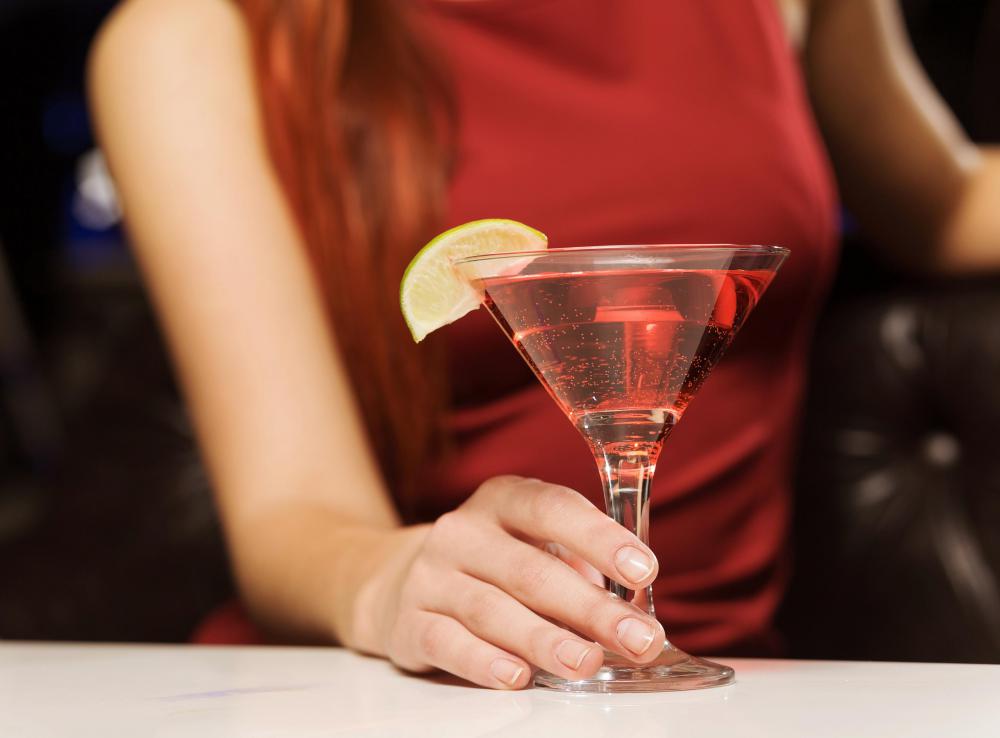At WiseGEEK, we're committed to delivering accurate, trustworthy information. Our expert-authored content is rigorously fact-checked and sourced from credible authorities. Discover how we uphold the highest standards in providing you with reliable knowledge.
Is It Safe to Combine Alcohol and Benzodiazepines?
Alcohol, specifically ethyl alcohol or ethanol, is the substance typically imbibed for relaxation and during specific social traditions, such as celebrations or wakes. Among its many effects upon multiple body systems, alcohol's most immediate impact is on the brain and the gamma aminobutyric acid (GABA) receptor system, and various neurotransmitters located within this organ. At small dosages, ethyl alcohol promotes relaxation and removes social inhibitions. Benzodiazepines are a class of medications with primary effects of anxiety reduction and mild sedation that utilize the same GABA receptors utilized by alcohol. Alcohol and benzodiazepines consumed together have a decidedly dangerous concomitant and synergistic effect that can result in over-sedation, loss of consciousness, respiratory depression and death.
There are many different types of drugs within the benzodiazepine family and one of the major ways they are characterized is by their length of action. Benzodiazepines are often categorized as short acting to long acting in nature. One of the most common means of measuring the drug's length of action is to measure its half-life, or the number of hours required for the body to metabolize 50 percent of the active drug in the body. Most benzodiazepines have a half-life of approximately 10 to 15 hours; however, longer acting compounds can have half-lives of up to 100 hours. Thus, alcohol and benzodiazepines do not even have to be taken within the same two or even three-day period to have potential interactions.

Using the same neurotransmitter system in the brain, alcohol and benzodiazepines both cause relaxation, a decrease in anxiety and sedation at higher doses of either substance. Even higher doses of either drug can result in lightheadedness and difficulty in maintaining one's balance. Short-term memory loss is also a common side effect of both drugs individually and particularly when combined. In addition to these effects, alcohol and benzodiazepines can also depress the respiratory center of the brain. Additional respiratory depression can lead to apnea — cessation of breathing — suffocation and death, a significant cause of death when these two substances are combined in excess.

Alcohol and benzodiazepines, however, also have a therapeutic use in medicine, specifically during alcohol detoxification after long periods of significant alcohol use. During this medically managed procedure, benzodiazepines are administered to prevent seizures secondary to abrupt alcohol withdrawal and to smooth out the body's rebound excitability in the absence of its usually tranquilizing alcohol intake. Benzodiazepines are administered for a short period and then the dosage is gradually tapered to discontinuation. Detoxification of patients who are dependent upon both alcohol and benzodiazepines markedly complicates the process, and increases both the risks of side effects and the necessary timeframe.
AS FEATURED ON:
AS FEATURED ON:















Discussion Comments
A college friend of mine died from mixing drugs and alcohol. He simply had respiratory failure. One of the drugs he took was a benzodiazepine. I was at the hospital while the doctors did blood tests to determine all that he took.
That's not all, he decided to take a drive while completely high on these substances. He had a car accident and took someone else's life too. He died in the hospital a few hours later.
This might sound like an extreme example, but it's not. Many people die from these types of combinations and they harm others around them. So is it safe to combine alcohol and benzodiazepines? Absolutely not!
And I hope those who are depressed or suicidal don't come to wrong conclusions by this comment. Because this combination may not necessary lead to death. It may lead to organ failure or an accident that may leave one handicapped. It's just a bad idea to combine them. Don't do it.
@fBoyle-- Unfortunately, yes. I did once. I'm not sure what I was thinking. My doctor had told me to avoid alcohol but I thought that doctors say that about every medication, so I didn't take it seriously. But boy did I regret it later.
I think that the most dangerous side effect of combining alcohol and benzodiazepines is memory loss. Not only does it cause confusion and out of control behavior, but it also causes the person to drink more or take more medications. At one point, I couldn't remember whether I had something to drink, so I was trying to have more. My friends were thankfully there and stopped me. Of course, I don't remember any of this. I was described the events of that night like a story the next day. Apparently I was not myself and I couldn't remember anything. I kept asking my friends who they were and how I had gotten there. They were so scared.
So I advise everyone to stay far away from alcohol while being treated with benzodiazepines. The side effects are very serious.
Has anyone combined alcohol and benzodiazepines before? Did you experience many negative side effects? What happened?
Post your comments